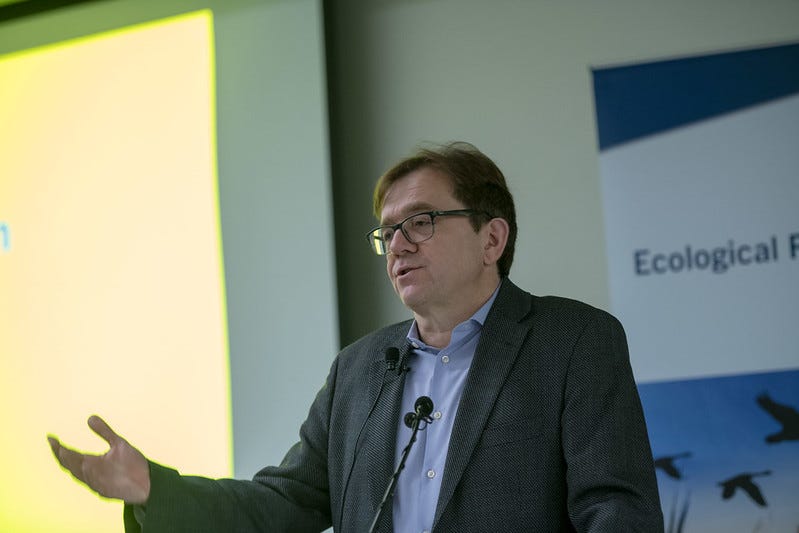What I Would Have Asked Minister of Energy Jonathan Wilkinson
The minister's office reached out to me on Monday asking if I wanted an interview. After delaying it six times, they cancelled.

Those familiar with my work know that I don’t do access journalism.
But when the office of a Minister of the Crown reaches out with the opportunity to conduct an interview about a policy of significant public importance, I’m not one to turn the opportunity down.
That’s what happened Monday, when a staffer in Minister of Energy and Natural Resources Canada Jonathan Wilkinson’s office offered me a 10-minute interview on the emissions cap that day.
They must have appreciated my reporting on the UCP AGM’s climate denial policy resolution over the weekend, because the interview was pitched as an opportunity to respond to the Alberta government’s state-sponsored misinformation campaign regarding the cap.
I’m not going to identify the staffer, because I’m convinced they genuinely tried to make the interview happen, but after six delays this week, they reached out to me this morning to say the interview was off.
Here’s the chronology:
First they offered me a block of times on Monday. After I told them I intended to use the interview as a brief Orchardcast, they offered me a time on Wednesday.
Early on Wednesday morning, I got an email saying they will have to postpone to next week. Two hours later, I got an email saying they can actually do an interview at 4:10 p.m. EST, to which I agreed.
But then 45 minutes later, I received an email saying they need to move the interview to 2:05 p.m. EST, which I didn’t see until five minutes before the proposed time.
Later that day, the staffer apologized for the inconvenience, offering me Friday at 2:35 p.m. EST.
On Thursday, they say they have to push it back 15 minutes because Wilkinson got pulled into a briefing. Fine by me.
Then on Friday morning, I’m told the interview is cancelled, but that the staffer would like to reschedule at some point in the near future.
Rather than wait around for an interview that may or may not happen, I figured it would make more sense to provide readers with a glimpse into how difficult it is for independent media to arrange interviews with decision makers, even when their office initiated it.
So here are the questions I hoped to ask the minister. Keep in mind, the interview was supposed to be 10 to 15 minutes, so it’s unlikely I would have been able to ask all of them.
The draft emissions cap you unveiled Monday is part of a suite of climate policies your government has introduced, including the carbon tax, proposed Clean Electricity Regulations, tougher methane emissions reduction targets, phasing out the sale of combustible engine passenger vehicles, and the Sustainable Jobs Act. Why is it necessary for the government to add an oil and gas emissions cap to the mix?
Your government’s overall road-map to net zero by 2050 calls for a 40% to 45% cut to total 2005 emissions by 2030, as was agreed upon at COP21 in Paris. The draft emissions cap you’ve proposed for the fossil fuel sector is substantially weaker, calling for a 35% reduction from 2019 levels—when Canada’s emissions from oil and gas were greater than they were in 2005. The offsets system you’re introducing alongside the cap will require even less of industry in practice. In May 2023, the International Energy Agency said an oil and gas emissions cap needs to be significantly tougher than what’s being offered now, with a 60% reduction target from current levels by 2030. How do you respond to criticism from groups like Environmental Defence and Equiterre that, while the cap certainly represents progress on the road to net zero by 2050, you’re actually going easy on oil and gas producers?
In October, the Alberta government launched a $7-million ad campaign calling on your government to scrap what it calls an “energy production cap.” Your government maintains that oil and gas production will still increase by 16% once the cap is in effect, compared to 17% if it weren’t in place, due to the widespread adoption of methane abatement methods and carbon capture technology. But Premier Danielle Smith, who represents a party that is now officially dedicated to increasing CO2 emissions, has committed to doubling production. And while I’m loathe to defend the premier, I can’t help but inquire how an emissions cap, if it’s effective, won’t ultimately necessitate a production cap at some point over the next decade?
Implementing the cap, which your government promised in the 2021 election campaign, won’t begin until 2026, a year after the next federal election. Your colleague, and Premier Smith’s mortal enemy, Environment and Climate Change Minister Stephen Guilbeault, made a point of noting how the Liberals’ entire climate agenda is at risk if Conservative leader Pierre Poilievre wins the upcoming federal election. How is this not a clear example of your government delaying climate action for electoral purposes?
Soon after your government announced the draft cap on Monday, Premier Smith announced her intention to invoke the Alberta Sovereignty within a United Canada Act in an attempt to stymie its implementation, just as she did last year for the Clean Electricity Regulations. How does your government intend on responding to this insubordination from the provincial government in the province where most of the companies impacted by the cap are based?

